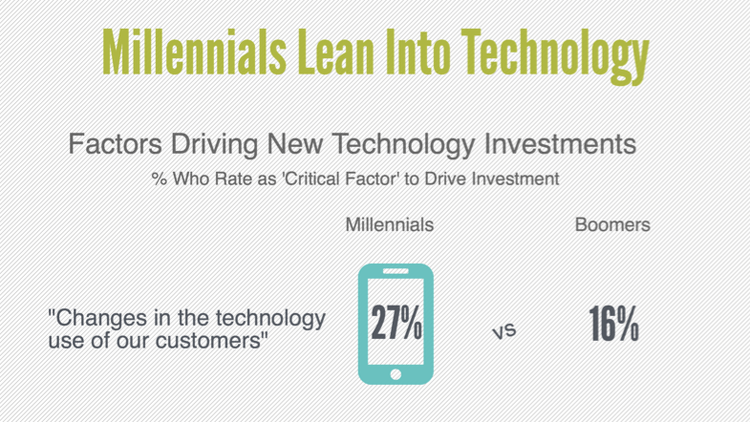From: bizjournals.com
The average baby boomer might see a 3-year-old desktop computer as an office workhorse, but the average millennial might see it as a liability.
That’s one major takeaway from a recent Business Journals survey of attitudes and behaviors of owners of small and mid-sized businesses toward technology. The survey involved interviewing more than 1,300 owners, executives, and other key decision makers for small and mid-sized businesses.
While boomer business owners embrace digital technology to a large degree, millennial business owners differ by viewing digital technology as a given, not merely a preference that has far-reaching implications for how business owners might attempt to attract and retain workers of different ages.
Millennials, people aged 18 to 35 years old, are still a small percentage of the nation’s business owners. As of 2012, about 16 percent of the 4.5 million American businesses with fewer than 500 employees were owned by millennials, whereas more than half, 51 percent, were owned by boomers, who are 50 years and older, the survey found.
As one might expect, millennial-owned businesses tend to be smaller than boomer-owned businesses. About 57 percent of the millennial-owned businesses in our survey reported annual sales below $1 million compared to 38 percent for boomers, meaning 43 percent of millennial-owned businesses said they earned more than $1 million in sales annually compared to 63 percent of boomer-owned businesses.
In a few more years millennials are likely to become the largest group of business owners, and they are in the process literally changing the face of the nation’s small business owners.
For example, there are far more women among millennial business owners than the boomers: 45 percent of millennial owners are women, compared to 25 percent of boomers. Moreover, 29 percent of millennial business owners are non-white, while 9 percent of boomers do.
And in other ways millennial business owners show differences from older business owners. Start with the technology tools boomer business owners use. About 84 percent of them reported using a desktop computer in the previous year, while 63 percent of millennials said they had. Millennials favor laptops, tablets and smartphones.
When surveying how business owners gather information, the differences become stark. Millennials gather information using computers, tablets, and smartphones more often than boomers by wide margins, and less than half of millennials said they look to print publications for news and information compared with two-thirds of boomers.
That split expressed itself in other ways, too. When boomers were asked where they would go to find new hires, 24 percent said they would use local newspaper classifieds, while 34 percent said they would go to online providers. On the other hand, 19 percent of millennial owners said they would go to the local newspapers and 46 percent said they would go online for their next hires.
Perhaps the most important information from the survey is what those key decision-makers say they will do moving forward.
For example, 48 percent of millennials reported that they intend to move elements of their businesses to the cloud in the next year, compared to 25 percent of boomer business owners saying they would. Across the board, the survey found, millennials also rated various aspects of cloud computing solutions as more beneficial to their businesses than boomers did, even though both groups reported equal levels of familiarity with cloud computing.
That intent is perhaps tied to another major attitude difference the Business Journals survey indicated. The results showed Boomer owners appear more willing to make new technology investments mainly once their current equipment and programs prove not up to the task. However, millennials are much more willing to try to get ahead of the technology curve, saying in greater numbers that they would upgrade their company’s technology in order to keep it up-to-date or as their customers’ technology progresses.
In other words, for younger business owners, quality digital technologies are not just something nice to have; they’re essential for running a business these days and those owners will make the necessary expenditures to keep up.
The Business Journals is a division of American City Business Journals, the nation’s largest publisher of local business news and information.
David A. Arnott is assistant news editor with The Business Journals.








Leave a Reply
You must be logged in to post a comment.